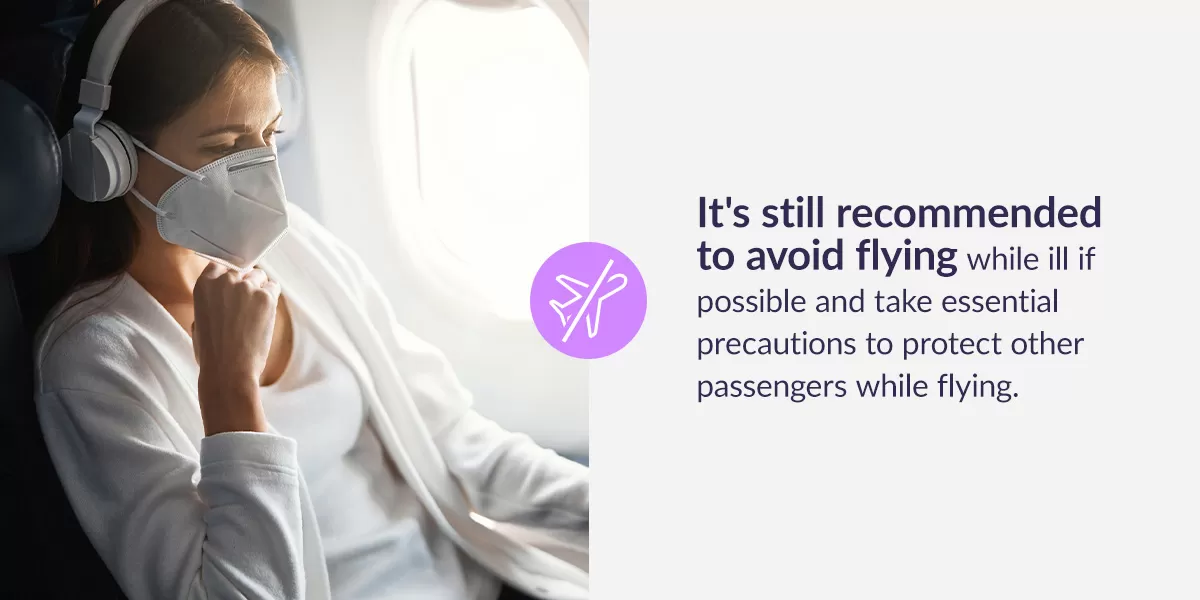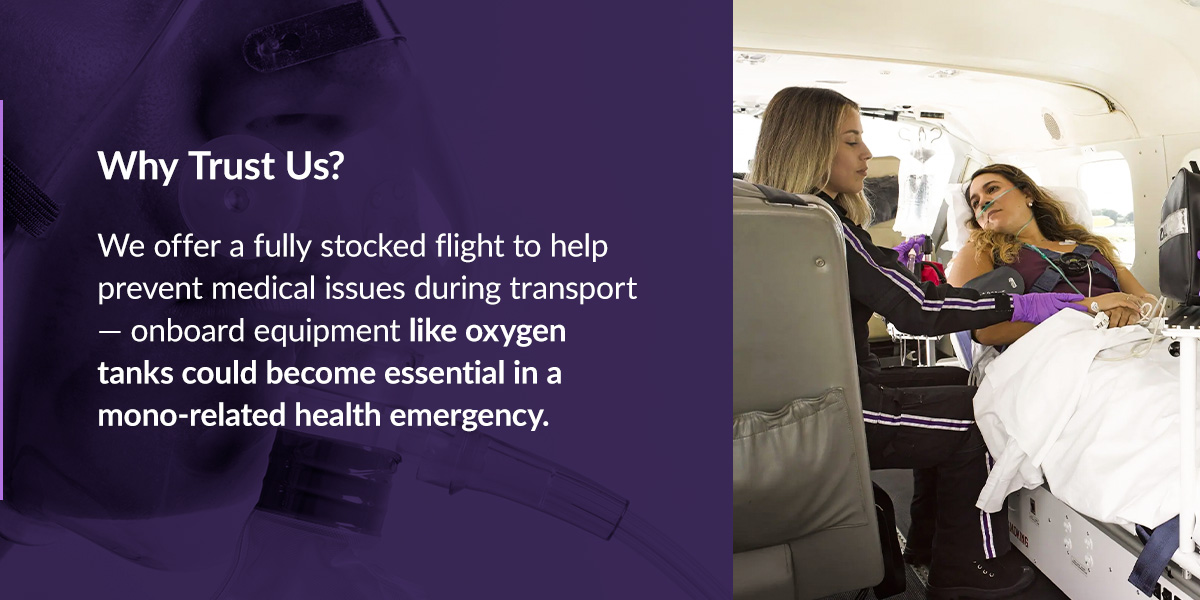Getting sick right before traveling can put a wrinkle in your plans. Coming down with an infection like mono might mean delaying your trip — but while it’s usually best to stay home when you’re sick, sometimes, you have to fly.
Taking the right precautions can keep you and your fellow passengers safe on your trip. Let’s take a look at traveling while sick so you can figure out if you can go on vacation if you have mono.
What Is Mono?
Mono, or mononucleosis, is a viral infection that’s usually caused by the Epstein-Barr virus. Symptoms of mono include sore throat, extreme fatigue, fever, swollen lymph nodes and an enlarged liver or spleen.
Since mono is spread through bodily fluids, it’s often called the “kissing disease,” although you can get it by sharing drinks or other items with infected saliva and through coughing or sneezing. Mono’s effects can be present for weeks or months, with high and low contagiousness periods.
How Contagious Is Mono?
Mono is not highly contagious, but you can still give it to other people if they come into contact with your saliva and other fluids. While everyone will have different contagious periods, you’re more contagious during the initial stages of the virus. On average, you’re contagious for six months after you get mono. This means you need to be cautious around other people for months after getting mono, even if you don’t feel sick anymore.
Remember to practice good hygiene and cover your mouth when coughing or sneezing to protect others.
Do You Have to Quarantine With Mono?
Mono usually cannot travel through the air, but it will spread to other people through saliva and fluids. Since it’s not highly contagious, you can usually avoid quarantining with mono. However, it’s essential to take precautions while traveling. Try to avoid close contact, avoid spreading fluids and take extra care around people who may be at higher risk, like younger individuals or people with weakened immune systems.
Can You Fly With Mono?
The U.S. Department of Transportation recommends staying home while sick, but you can technically fly with mono if necessary. It’s still recommended to avoid flying while ill if possible and take essential precautions to protect other passengers while flying.
What Are the Risks of Flying With Mono?
Flying with mono can be an uncomfortable experience. While you can prevent the spread of mono by taking certain precautions, the unique conditions during flight may have some health risks. If you’re experiencing severe symptoms or complications, consider rescheduling your flight or getting a medical escort service to avoid commercial flying.
Here are some potential risks associated with flying while sick with mono:
- Enlarged spleen: While flying won’t make your spleen enlarged, an enlarged spleen is a severe mono symptom. Enlarged spleens are at risk of rupturing, which can cause internal bleeding. You should avoid flying commercial with an enlarged spleen in case your health deteriorates on the flight, as you need to ensure you’re somewhere with access to emergency health services.
- Compromised immune system: Infections like mono can weaken your immune system. This means you’re more susceptible to other infections, which could create more severe complications. Sitting in a confined air cabin with other people and air that recirculates cabin germs could lead to a secondary infection.
- Fatigue: Flying can be physically demanding — changing air pressure, confined spaces and even reduced oxygen are all potential risks for people with health conditions. If you’re experiencing extreme fatigue or discomfort from your mono symptoms, you should consider staying home. Feeling unwell can make flying more uncomfortable than normal.
How to Fly Safely With Mono
Traveling and mono can be risky, but you can take steps to make it more comfortable and safe. Minimize the risk of spreading the virus while protecting your comfort with these tips:
- Ask a professional: Always consult your health care professional before flying with any illness. They’ll assess your health and let you know if they think air travel is safe. Additionally, they’ll give you personalized advice on your symptoms and any complications to watch out for.
- Use protection: Use face masks, regular hand washing, tissues and hand sanitizer to stay sanitary while flying. These tools will help you reduce the spread of germs, protecting other passengers.
- Stay hydrated: Make sure to drink lots of water during your flight. Dehydration can potentially make symptoms like sore throat and fatigue worse. You want to ensure your body is hydrated so it can perform at its best.
- Be comfortable: Wear comfortable clothing and pack any essential medications or care items in your personal bag. Pain relievers, throat lozenges and tissues can relieve your symptoms during the flight.
- Talk to staff: Consider informing the flight crew about your condition before takeoff, especially if you need special assistance or accommodations. They might be able to make your flight more comfortable.
- Avoid contact: Do your best to avoid close contact with other passengers. You’ll reduce the spread of your illness and protect potentially vulnerable fliers.
- Get rest: Try to sleep on the flight and take breaks from standing at the airport. Packing eye masks, noise-cancelling headphones and neck pillows can make resting on your flight easier.
Why Trust Us?
If you want to make flying a comfortable experience, consider requesting a REVA air ambulance for your trip. Flying with severe mono symptoms can be uncomfortable and dangerous. REVA air ambulances provide you with specialized equipment and expert care during your flight. Our expert team will provide you with professional medical care as you fly to your facility.
We offer a fully stocked flight to help prevent medical issues during transport — onboard equipment like oxygen tanks could become essential in a mono-related health emergency. Additionally, you’ll fly in a sterile environment with our professional medical staff, reducing your risk of secondary infections and ensuring you have medical experts ready during the entire flight. Trust REVA to provide unmatched care and fast transport wherever and whenever you need it.
Fly Safe With REVA
Whether you’re experiencing severe mono symptoms or you’re facing a medical emergency, REVA’s air ambulance services can get you the medical transport you need. With 24/7, 365 medical services, your fully equipped air ambulance is ready to get you to your destination. Our experienced team will provide fast, expert transport to the nearest appropriate medical facility.
With REVA, you can enjoy meticulous care and coordination. We arrange everything from ground transportation and insurance coverage to medical team coordination. Request an air ambulance now and travel with a trusted medical support team. Contact us today for a free air ambulance quote!



